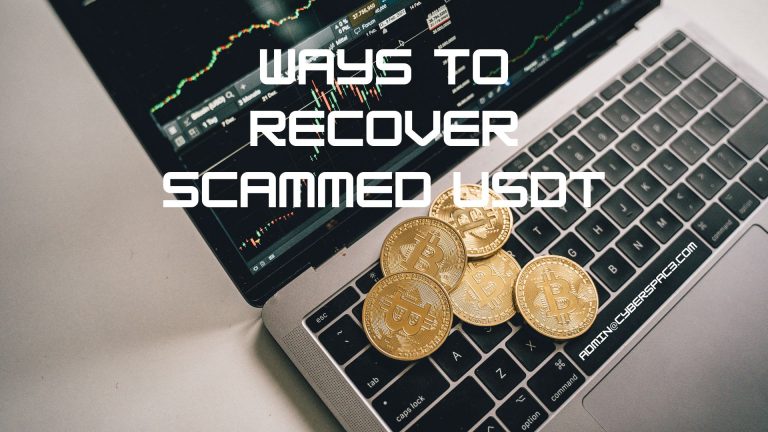1. Best Ways to Recovering Scammed Cryptocurrency 2024

Recovering Scammed Cryptocurrency: Have you fallen victim to a cryptocurrency scam and lost your hard-earned digital assets? Don’t despair! While getting scammed can be a devastating experience, recovering your stolen crypto isn’t entirely out of the realm of possibility. This article will be your guide through the complexities of cryptocurrency recovery. We’ll explore the challenges inherent to recouping stolen funds due to the decentralized nature of cryptocurrency. However, we’ll also delve into potential solutions, from the power of blockchain analysis to the legal avenues you can pursue.
But beware, the fight to reclaim your crypto isn’t the only hurdle you’ll face. Unscrupulous actors often prey on vulnerable victims with promises of easy recovery – these are recovery scams themselves! We’ll equip you with the knowledge to identify and avoid these deceptive schemes.
By the end of this comprehensive guide, you’ll be armed with the information you need to navigate the often-murky waters of cryptocurrency recovery. We’ll not only explore the options for getting your stolen funds back, but also provide valuable tips to prevent falling victim to scams in the first place. So, take a deep breath, and let’s embark on this journey together!
Recovering Scammed Cryptocurrency: Can You Really Get Scammed Crypto Back?

Recovering stolen cryptocurrency presents a unique set of challenges compared to traditional financial systems. Unlike banks with oversight and control mechanisms, cryptocurrency operates on a decentralized network. This means there’s no central authority to freeze accounts or reverse transactions. Once a crypto transaction is confirmed on the blockchain, a public ledger of all transactions, it’s virtually irreversible.
However, this decentralized nature doesn’t completely slam the door shut on recovery. Blockchain analysis has emerged as a powerful tool in the fight against cryptocurrency theft. By analyzing the complex web of transactions on the blockchain, specialists can potentially trace the movement of stolen funds. This can provide valuable information for law enforcement or even help identify the culprits themselves.
It’s important to remember that blockchain analysis isn’t a magic bullet. The success rate depends on various factors, and it’s not always a guaranteed path to reclaiming your lost crypto. But in the ever-evolving world of cryptocurrency, blockchain analysis offers a glimmer of hope for victims of scams.
Taking Action: A Two-Pronged Approach to Recovering Scammed Cryptocurrency

The aftermath of a cryptocurrency scam can be overwhelming. But before resignation sets in, there are steps you can take to fight for your stolen assets. This approach involves a two-pronged strategy: immediate actions and investigative measures.
Swift Steps: Reacting Immediately to a Scam
The first few hours after discovering a scam are crucial. Here’s what you should do without delay:
- Report the Scam: File a complaint with the relevant authorities, such as the Federal Trade Commission (FTC) in the US or the Internet Crime Complaint Center (IC3). This not only helps gather data on crypto scams but may also assist in future investigations.
- Gather Evidence: Every scrap of information counts. Collect screenshots of transactions, communication with the scammers, and any other relevant details. This evidence will be crucial if you pursue legal action or involve law enforcement.
- Contact the Platform (if applicable): If the scam involved an exchange or platform, report the fraudulent transaction immediately. They may be able to freeze the account where your stolen crypto was sent, potentially preventing further movement of funds.
Digging Deeper: Investigative Measures
Once the initial shock subsides, it’s time to delve deeper. Here are some options to consider, but remember, each has its own set of considerations:
- Blockchain Analysis: Blockchain analysis services can be a powerful tool for tracing stolen funds. These specialists use sophisticated techniques to analyze blockchain data, potentially revealing the path your crypto took. However, these services can be expensive and the success rate isn’t guaranteed.
- Legal Options: Consulting with a lawyer experienced in cryptocurrency fraud is an option. They can advise you on the legal avenues for pursuing the scammers, such as civil lawsuits. This path can be complex and potentially costly, so careful evaluation is crucial.
Remember, the best course of action will depend on the specifics of your situation. Weigh the potential benefits and costs of each option before making a decision.
Beware of Recovery Scams! Don’t Be Scammed Twice

Unfortunately, the misery of a cryptocurrency scam can be compounded by another – recovery scams. These predatory schemes target vulnerable victims with false promises of retrieving their stolen assets. These scammers thrive on desperation, so it’s crucial to be aware of their tactics.
The Bait and Switch: How Recovery Scams Work
Recovery scams come in various forms, but they all share a common goal: to steal even more from you. Here are some red flags to watch out for:
- Fake Services and Empty Promises: These scammers may create elaborate websites or social media profiles boasting unrealistic success rates and “guaranteed” recovery. Don’t be fooled by empty promises.
- Pressure Tactics and a Sense of Urgency: These scammers will often try to pressure you into acting quickly, emphasizing a limited window to recover your funds. This is a tactic to cloud your judgment and prevent you from doing proper research.
Fight Back: Tips to Avoid Recovery Scams
Knowledge is your best weapon against recovery scams. Here’s how to protect yourself:
- Never Share Your Private Keys: These are the keys to your crypto kingdom. Never, under any circumstances, share your private keys with anyone claiming to recover your funds.
- Research Before You Commit: Don’t fall for fancy websites or social media profiles. Research any recovery service thoroughly, checking online reviews and verifying their legitimacy.
- Free Consultations are a Good Sign: Reputable services will typically offer free consultations to assess your situation before discussing upfront fees. Note: there will always be upfront fee before you get the results you are looking for.
By following these tips and staying vigilant, you can avoid becoming a double victim of cryptocurrency scams. Remember, if something seems suspicious, it probably is. Trust your gut and don’t hesitate to walk away from any recovery service that raises red flags.
Recovering Scammed Cryptocurrency: Preventing Crypto Scams

While recovering stolen crypto is an uphill battle, the best defense against scams is a strong offense – awareness and education. Let’s explore some of the most common cryptocurrency scams and the security best practices you can adopt to safeguard your digital assets.
The Deceptive World of Crypto Scams
Scammers are constantly innovating, but some common themes emerge. Here’s what to be wary of:
- Pump-and-Dump Schemes: These scams involve artificially inflating the price of a cryptocurrency through false hype and misleading information. Once the price reaches a peak, the scammers sell their holdings, leaving unsuspecting investors holding the bag as the price plummets.
- Fake Investment Opportunities: These scams lure victims with unrealistic promises of high returns on “revolutionary” crypto projects. Often, these projects are entirely fabricated, designed to steal your investment.
This is just a glimpse into the ever-evolving landscape of crypto scams. By staying informed about common tactics, you’ll be better equipped to identify and avoid them.
Building a Fortress: Security Best Practices for Crypto
Now that you’re aware of the threats, let’s build some defenses! Here are some essential security practices:
- Use Reputable Exchanges: Only use well-established and regulated cryptocurrency exchanges with a strong track record of security. Avoid obscure or fly-by-night platforms.
- Enable Two-Factor Authentication (2FA): This adds an extra layer of security to your accounts by requiring a second verification code in addition to your password. Don’t skip this crucial step!
- Store Crypto Securely: Consider storing your cryptocurrency in a hardware wallet, a physical device that keeps your private keys offline and away from online vulnerabilities.
- Be Wary of Social Media and Online Hype: Don’t make investment decisions based on social media recommendations or online hype. Do your own research and verify information before committing any funds.
By following these best practices and maintaining a healthy dose of skepticism, you can significantly reduce your risk of falling victim to a cryptocurrency scam. Remember, if an investment opportunity seems too good to be true, it probably is.
Conclusion: Fighting for Your Crypto and Building a Secure Future
The journey to recover scammed cryptocurrency can be arduous. The decentralized nature of crypto presents challenges, but avenues like blockchain analysis and legal action offer a glimmer of hope. However, the success rate depends on various factors, and there’s no guaranteed path to reclaiming your lost funds.
The best defense against the heartbreak of a scam lies in prevention. By arming yourself with knowledge about common scams and adopting robust security practices – using reputable exchanges, enabling 2FA, and storing crypto securely – you can significantly reduce your risk of falling victim.
If you’ve been scammed, don’t despair. Report the incident to the relevant authorities and seek legitimate help. While recovery may be complex, you’re not alone. There are resources available to guide you through this challenging experience.
Remember, the world of cryptocurrency is exciting but also carries inherent risks. By staying vigilant, informed, and cautious, you can navigate this landscape with confidence and protect your valuable digital assets. Let this be the turning point in your crypto journey – a journey built on knowledge, security, and the power to fight back against scams.






